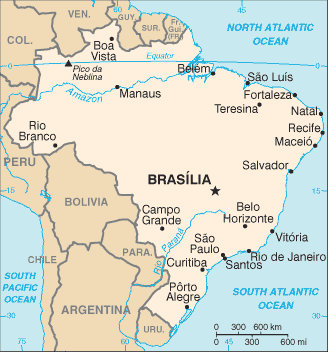 |
usa | world | animals | vocabulary | health | science | math | history |
Brazil

Map Courtesy CIA World Factbook
The Federative Republic of Brazil (República Federativa do Brasil in Portuguese) is the largest and most populous country in Latin America, and fifth largest in the world. Spanning a vast area between central South America and the Atlantic Ocean, it is the easternmost country of the Americas and it borders Uruguay, Argentina, Paraguay, Bolivia, Peru, Colombia, Venezuela, Guyana, Suriname and French Guiana — every South American nation except for Ecuador and Chile. Named after brazilwood, a local tree, Brazil is home to both extensive agricultural lands and rain forests. A former colony of Portugal, Brazil has Portuguese as its official language.
Brazil had been inhabited for at least 6,000 years by semi-nomadic populations when the first Portuguese explorers, led by Pedro Álvares Cabral disembarked in 1500. Over the next three centuries it was re-settled by the Portuguese and exploited mainly for brazilwood at first, and later for sugarcane agriculture. Work in the colony was based on slavery. In 1808 King João VI of Portugal, fleeing from Napoleon, relocated to Brazil with the royal family, nobles and government. Though they returned in 1821, the interlude led to the opening of commercial ports to England — at the time isolated from most European ports by Napoleon — and the "elevation" of Brazil to the status of a Kingdom united to Portugal's Crown. Then prince-regent Dom Pedro I declared independence on 7 September 1822, establishing the independent Empire of Brazil. This lasted until the next emperor, Dom Pedro II was deposed and a federal republic was established on 15 November 1889. In the late 19th and early 20th centuries, Brazil attracted over 5 million European and Japanese immigrants. That period also saw Brazil industrialise and further occupy its interior. Brazilian democracy was replaced by dictatorship three times — 1930–1934 and 1937–1945 under Getúlio Vargas, and 1964–1985 under a succession of generals appointed by the military. Today Brazil is a democracy.
This article is licensed under the GNU Free Documentation License. It uses material from the Wikipedia article "Africa".